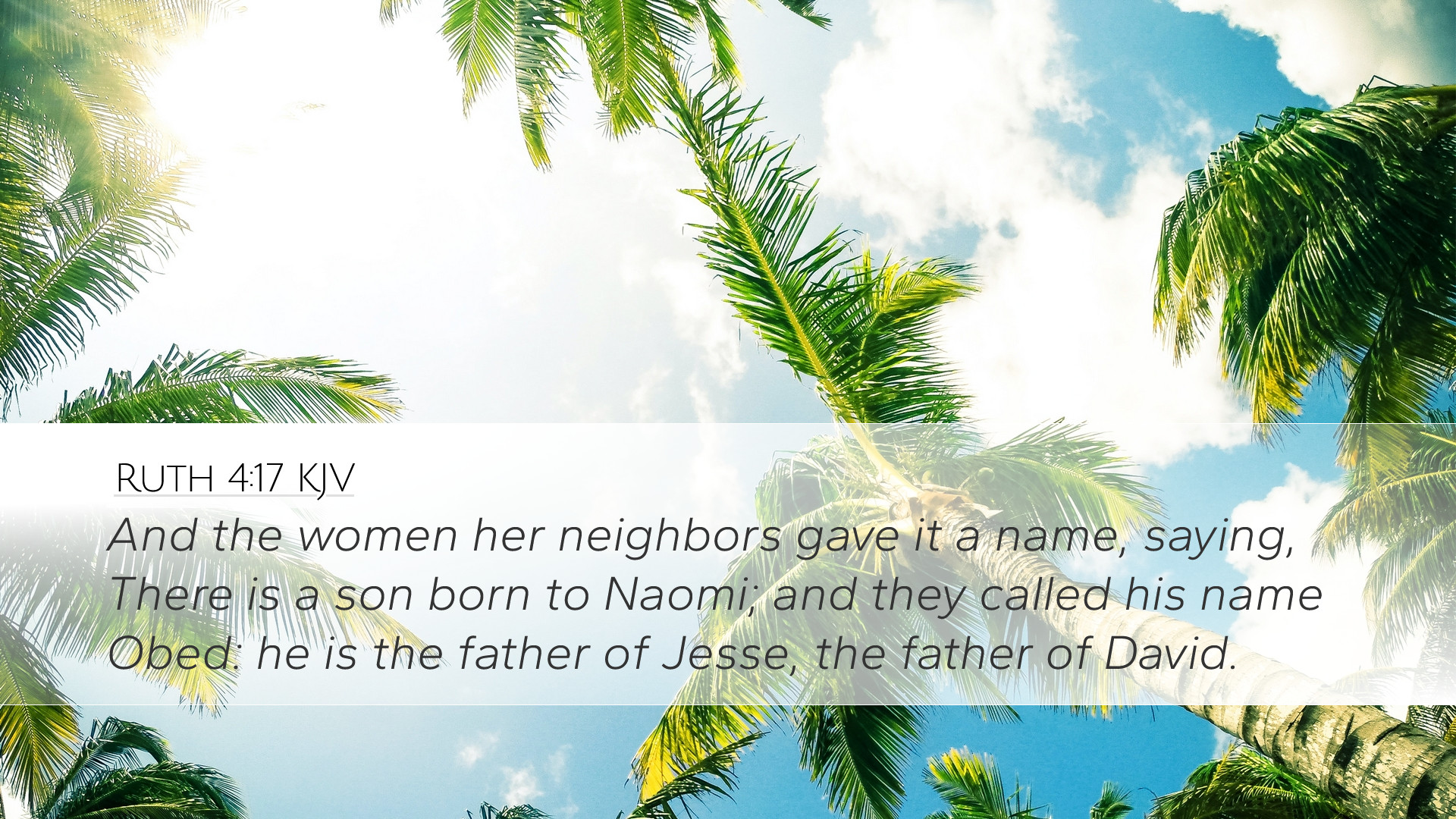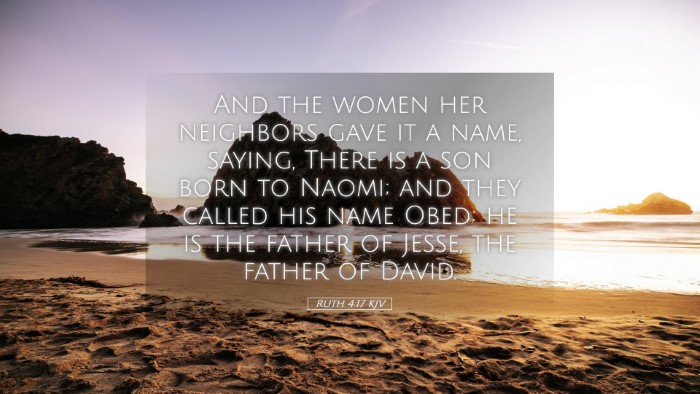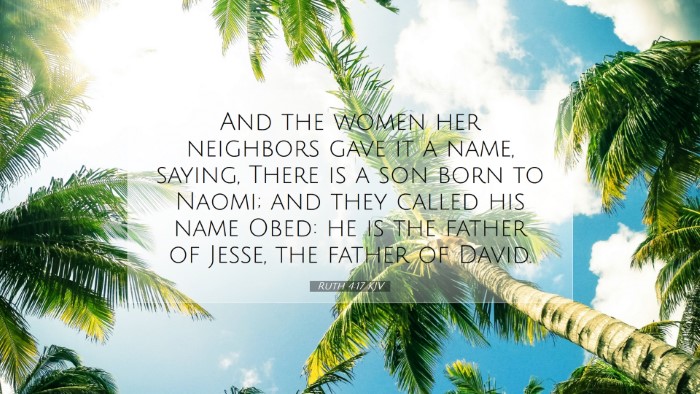Old Testament
Genesis Exodus Leviticus Numbers Deuteronomy Joshua Judges Ruth 1 Samuel 2 Samuel 1 Kings 2 Kings 1 Chronicles 2 Chronicles Ezra Nehemiah Esther Job Psalms Proverbs Ecclesiastes Song of Solomon Isaiah Jeremiah Lamentations Ezekiel Daniel Hosea Joel Amos Obadiah Jonah Micah Nahum Habakkuk Zephaniah Haggai Zechariah MalachiRuth 4:17
Ruth 4:17 KJV
And the women her neighbors gave it a name, saying, There is a son born to Naomi; and they called his name Obed: he is the father of Jesse, the father of David.
Ruth 4:17 Bible Commentary
Commentary on Ruth 4:17
Ruth 4:17 states, "And the women said unto Naomi, Blessed be the Lord, which hath not left thee this day without a kinsman, that his name may be famous in Israel." This verse concludes the story of Ruth and Boaz, reflecting the themes of redemption, family, and the providence of God.
1. Contextual Background
The Book of Ruth is set during the time of the Judges, a period characterized by social turmoil and moral ambiguity in Israel’s history. The narrative contrasts the prevalent corruption and chaos by highlighting individual faithfulness and divine providence.
2. The Role of Women
This passage emphasizes the role of women in the narrative. The women of the community express their joy and gratitude to Naomi for the provision of a kinsman-redeemer. Their declaration serves as both a blessing and a recognition of God's faithfulness.
- Collective Voice: The women’s voices represent communal support and affirmation, highlighting the importance of community in theological reflection and worship.
- Divine Providence: The mention of God’s blessing underscores the belief that God actively participates in the lives of His people, orchestrating events for their ultimate good.
3. Kinsman-Redeemer Significance
The concept of the kinsman-redeemer (Hebrew: go’el) is pivotal in this verse. Boaz, acting as the go’el, fulfills his responsibility to redeem Ruth and restore Naomi’s family line. This reflects God's redemptive work through Christ as the ultimate Kinsman-Redeemer.
- Historical Context: According to the Levitical laws (Leviticus 25), a kinsman-redeemer had the duty to buy back family land and care for relatives in distress (Deuteronomy 25:5-10).
- Typology of Redemption: Boaz's actions are seen as a foreshadowing of Christ’s redemptive work, illustrating the deeper theological narrative of salvation history.
4. The Name of the Redeemer
The statement that “his name may be famous in Israel” suggests the significance of legacy and family name within the Israelite culture. In an honor-shame society, the reputation of a family was paramount. This verse looks forward to the lineage of David, as Ruth becomes the great-grandmother of the future king of Israel.
- Legacy in God’s Plan: This emphasizes how individual lives and actions contribute to God's overarching narrative of redemption, culminating in Jesus Christ.
- Application for Believers: The desire for a name to be famous suggests that believers are called to live in such a way that their lives reflect God’s glory and honor.
5. Theological Themes
Several key theological themes emerge from Ruth 4:17:
- God's Faithfulness: The verse is a testimony to God's unceasing faithfulness. Naomi, once empty and bitter, is now blessed with a redeemer, showcasing God’s restoration.
- Community and Support: The women of Bethlehem embody the nurturing aspect of community among believers, reminding the church of the importance of support and encouragement in faith.
- Hope and Redemption: The closing of the book reflects hope amid despair, as God works through ordinary lives to fulfill His redemptive purposes.
6. Practical Applications
This verse invites reflection on how believers today can embody the principles illustrated in the story of Ruth and Naomi.
- Restoration: Individuals can engage in acts of kindness and service, promoting restoration within their communities.
- Embracing Community: Churches can emphasize the importance of community support, ensuring that no one is left in isolation during their struggles.
- Faithfulness in Adversity: The story of Ruth encourages believers to remain faithful in times of trial, trusting in God’s purpose and timing.
7. Conclusion
Ruth 4:17 encapsulates the essence of the Book of Ruth, illustrating God's providence through the relationships and faithfulness of individuals. For pastors, theologians, and students of the scripture, the passage invites deep theological reflection on the implications of redemption, community, and the faithfulness of God throughout history. It reminds us that our lives can serve as conduits of God's grace, contributing to His grand narrative of redemption in the world.


